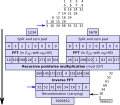The Tonelli–Shanks algorithm (referred to by Shanks as the RESSOL algorithm) is used in modular arithmetic to solve for r in a congruence of the form...
19 KB (3,751 words) - 01:15, 9 July 2025
Tonelli may refer to: Tonelli (surname) Tonelli (film), a 1943 German film Tonelli's theorem (functional analysis) Tonelli's theorem Tonelli–Shanks algorithm...
339 bytes (68 words) - 18:32, 16 December 2023
Shanks' square forms factorization is a method for integer factorization devised by Daniel Shanks as an improvement on Fermat's factorization method....
10 KB (1,383 words) - 11:13, 16 December 2023
method that generalizes Fermat's factorization method; and the Tonelli–Shanks algorithm that finds square roots modulo a prime, which is useful for the...
7 KB (719 words) - 06:44, 16 May 2025
finding algorithm Cipolla's algorithm Tonelli–Shanks algorithm Multiplication algorithms: fast multiplication of two numbers Karatsuba algorithm Schönhage–Strassen...
72 KB (7,951 words) - 17:13, 5 June 2025
{\displaystyle k-1} times. For this, Cipolla's algorithm is better than the Tonelli–Shanks algorithm if and only if S ( S − 1 ) > 8 m + 20 {\displaystyle...
13 KB (3,042 words) - 05:54, 24 June 2025
the generalized Riemann hypothesis holds as explained for the Tonelli–Shanks algorithm. Given an odd prime p {\displaystyle p} in the form 4 k + 1 {\displaystyle...
36 KB (6,470 words) - 14:24, 29 July 2025
In mathematics, the Euclidean algorithm, or Euclid's algorithm, is an efficient method for computing the greatest common divisor (GCD) of two integers...
126 KB (15,342 words) - 01:03, 25 July 2025
Pollard's rho algorithm is an algorithm for integer factorization. It was invented by John Pollard in 1975. It uses only a small amount of space, and...
13 KB (1,755 words) - 06:12, 18 April 2025
and computer programming, the extended Euclidean algorithm is an extension to the Euclidean algorithm, and computes, in addition to the greatest common...
28 KB (4,467 words) - 20:39, 9 June 2025
found will quickly produce one. A slight variant of this algorithm is the Tonelli–Shanks algorithm. If the modulus n is a prime power n = pe, a solution...
54 KB (5,575 words) - 07:28, 20 July 2025
Integer factorization (redirect from Prime factorization algorithm)
sieve Shanks's square forms factorization (SQUFOF) Shor's algorithm, for quantum computers In number theory, there are many integer factoring algorithms that...
25 KB (2,977 words) - 21:02, 19 June 2025
The Schönhage–Strassen algorithm is an asymptotically fast multiplication algorithm for large integers, published by Arnold Schönhage and Volker Strassen...
26 KB (4,580 words) - 11:43, 4 June 2025
Shor's algorithm is a quantum algorithm for finding the prime factors of an integer. It was developed in 1994 by the American mathematician Peter Shor...
40 KB (5,809 words) - 20:55, 1 August 2025
multiplication algorithm is an algorithm (or method) to multiply two numbers. Depending on the size of the numbers, different algorithms are more efficient...
47 KB (6,886 words) - 11:27, 22 July 2025
Sieve of Eratosthenes (category Algorithms)
In mathematics, the sieve of Eratosthenes is an ancient algorithm for finding all prime numbers up to any given limit. It does so by iteratively marking...
24 KB (3,053 words) - 20:26, 5 July 2025
In computational number theory, the index calculus algorithm is a probabilistic algorithm for computing discrete logarithms. Dedicated to the discrete...
11 KB (1,763 words) - 17:23, 21 June 2025
The Karatsuba algorithm is a fast multiplication algorithm for integers. It was discovered by Anatoly Karatsuba in 1960 and published in 1962. It is a...
13 KB (2,046 words) - 20:43, 4 May 2025
The binary GCD algorithm, also known as Stein's algorithm or the binary Euclidean algorithm, is an algorithm that computes the greatest common divisor...
17 KB (1,993 words) - 13:05, 28 January 2025
Pollard's rho algorithm for logarithms is an algorithm introduced by John Pollard in 1978 to solve the discrete logarithm problem, analogous to Pollard's...
7 KB (1,187 words) - 18:02, 2 August 2024
Baby-step giant-step (category Number theoretic algorithms)
meet-in-the-middle algorithm for computing the discrete logarithm or order of an element in a finite abelian group by Daniel Shanks. The discrete log problem...
7 KB (1,061 words) - 19:23, 24 January 2025
Integer square root (category Number theoretic algorithms)
y {\displaystyle y} and k {\displaystyle k} be non-negative integers. Algorithms that compute (the decimal representation of) y {\displaystyle {\sqrt {y}}}...
26 KB (3,191 words) - 07:11, 19 May 2025
Solovay–Strassen primality test (redirect from Solovay-Strassen algorithm)
composite return probably prime Using fast algorithms for modular exponentiation, the running time of this algorithm is O(k·log3 n), where k is the number...
10 KB (1,518 words) - 08:52, 27 June 2025
Primality test (category Asymmetric-key algorithms)
A primality test is an algorithm for determining whether an input number is prime. Among other fields of mathematics, it is used for cryptography. Unlike...
27 KB (3,833 words) - 09:23, 3 May 2025
A division algorithm is an algorithm which, given two integers N and D (respectively the numerator and the denominator), computes their quotient and/or...
43 KB (5,900 words) - 04:46, 16 July 2025
Greatest common divisor (section Euclid's algorithm)
|a|. This case is important as the terminating step of the Euclidean algorithm. The above definition is unsuitable for defining gcd(0, 0), since there...
36 KB (4,747 words) - 07:30, 1 August 2025
Lenstra–Lenstra–Lovász (LLL) lattice basis reduction algorithm is a polynomial time lattice reduction algorithm invented by Arjen Lenstra, Hendrik Lenstra and...
15 KB (2,154 words) - 23:50, 19 June 2025
In number theory, Berlekamp's root finding algorithm, also called the Berlekamp–Rabin algorithm, is the probabilistic method of finding roots of polynomials...
12 KB (2,006 words) - 20:25, 19 June 2025
theory, Williams's p + 1 algorithm is an integer factorization algorithm, one of the family of algebraic-group factorisation algorithms. It was invented by...
5 KB (831 words) - 21:06, 30 September 2022
Miller–Rabin primality test (redirect from Miller-Rabin algorithm)
or Rabin–Miller primality test is a probabilistic primality test: an algorithm which determines whether a given number is likely to be prime, similar...
38 KB (5,639 words) - 20:26, 3 May 2025






